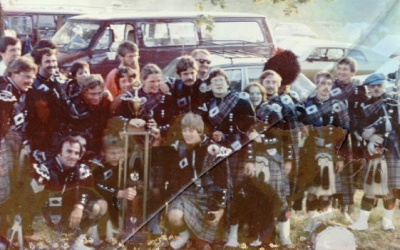

The Guelph Pipe Band was formed in 1922, and has been continuously active since that time. Its members are proud to wear the McCrae tartan in honour of Colonel John McCrae, a native of Guelph, Ontario, and the author of In Flanders Fields.
The band has played for a long list of dignitaries who have visited Guelph over the years, including: King George VI and Queen Elizabeth II, Prime Ministers Louis St. Laurent, John Diefenbaker, and Pierre Trudeau, Premier George Drew, and Governor General Roland Michener.

Band members served during the Second World War in the Highland Light Infantry with Pipe Major Art Corstorphine, one of the Guelph Pipe Band’s original members. Corstorphine was the leading Pipe Major when Canadian pipe bands marched into Berlin in 1945 at the end of the war.
Following World War II, the pipes and drums were rejuvenated under Pipe Major Bob Whittle, and they competed regularly in Grade II on the Ontario highland games circuit. This phase in the band’s history culminated in a trip to Scotland in 1968 to compete in Grade III there.
In the fall of 1968, Ed Neigh took over as Pipe Major. In 1970,the band captured the North American Championship in Grade II, and, one year later, after winning Champion Supreme, were promoted to the premier grade in Ontario. In 1976 at Maxville, the Guelph Pipe Band won the North American Pipe Band Championship in Grade I. This feat was followed three weeks later by similar success as the Guelph Pipe Band became the first Canadian band to win the Intercontinental Pipe Band Championship at the CNE in Toronto.

Another trip to Scotland was undertaken in 1977. The Drum Corps, which had dominated in Ontario that season, won the drumming at the Intercontinental Championship, beating all Scottish rivals. Special recognition was awarded the Guelph Pipe Band by the BBC when the band became the first Canadian pipe band ever engaged to give a radio recital in Scotland. This was also the year that the band recorded an album, The Guelph Pipe Band.
